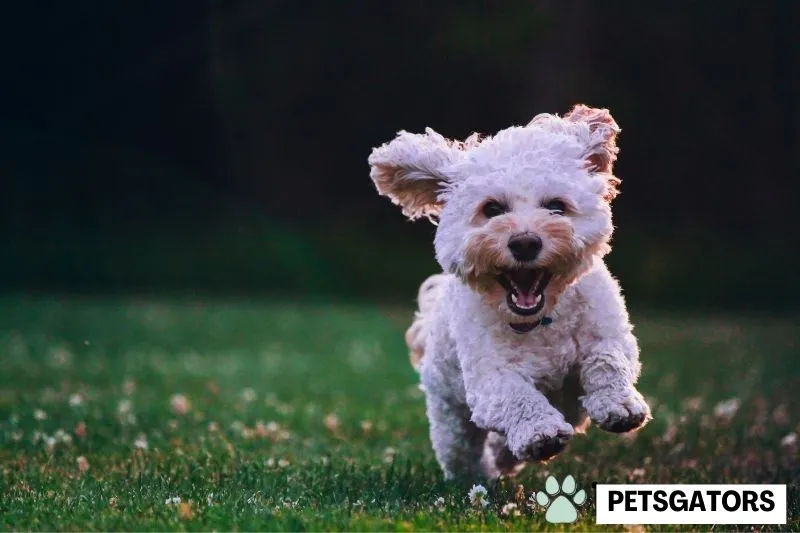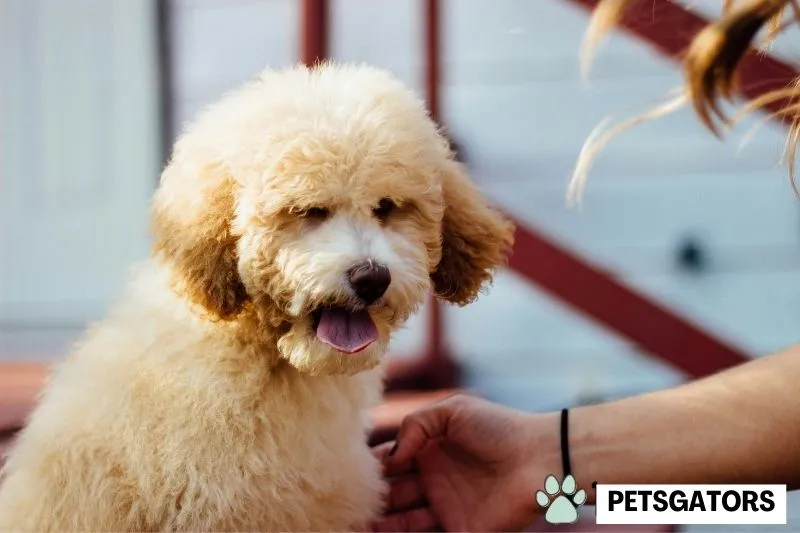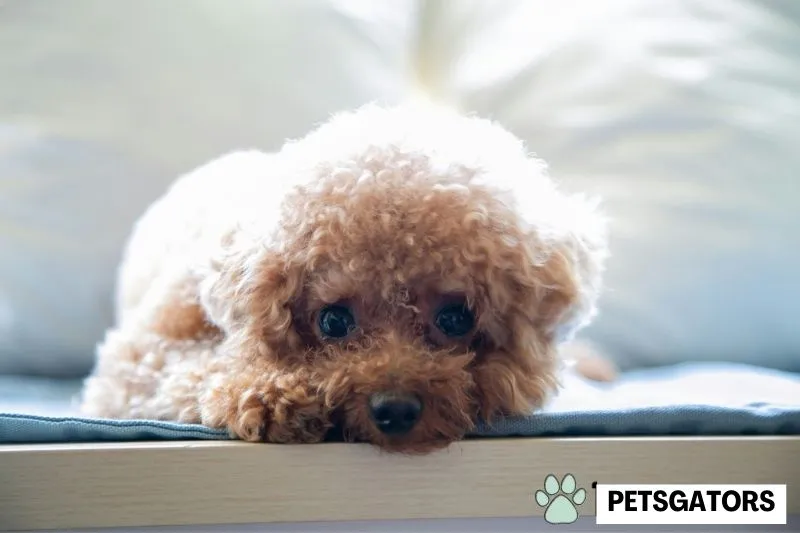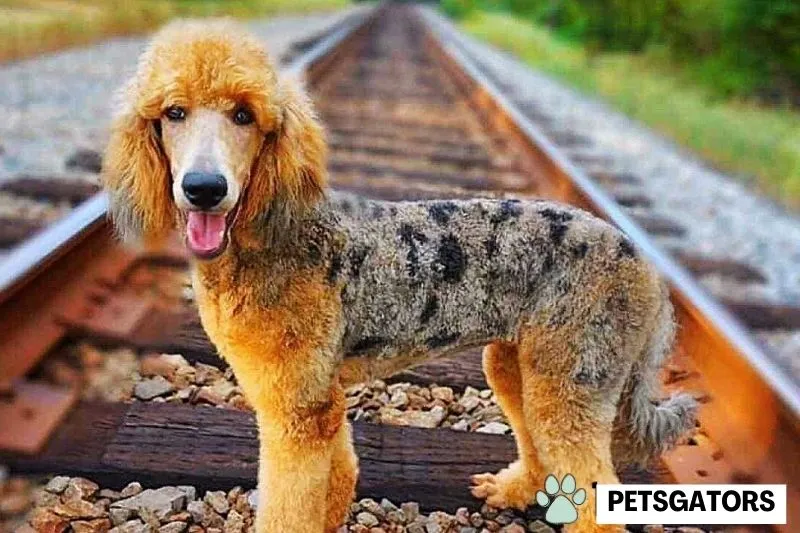Merle Poodle
Raising a happy, healthy Merle Poodle can be a uniquely rewarding experience. Known for their distinctive coat patterns and friendly disposition, Merle Poodles are a popular choice among dog lovers. However, caring for these special dogs requires specific knowledge and attention. This guide aims to provide comprehensive insights into the world of Merle Poodles, from understanding their health concerns to ensuring their happiness and well-being.

Table of Contents
What is a Merle Poodle?
Merle Poodles are Poodles that have a unique coat pattern known as ‘merle’. This pattern is characterized by patches of color interspersed with lighter shades, often creating a mottled or speckled effect. While stunning, this pattern is more than just skin deep, as it is linked to genetic variations that can impact the dog’s health.
Are Merle Poodles Healthy?
Like all dogs, Merle Poodles can be healthy if bred responsibly. However, the Merle gene can sometimes lead to health complications, particularly if breeding is not done carefully. It’s crucial for potential owners to understand these risks and seek out reputable breeders who prioritize the health and welfare of their dogs.
Obtaining a Merle Poodle
When looking to get a Merle Poodle, it’s essential to do your research. A great starting point is “The Ultimate Guide To The Blue Merle Poodle: Everything You Need To Know” (PetPawsHub), which offers in-depth information about this specific color variant. Always opt for breeders who conduct health screenings and can provide a clear history of the puppy’s lineage.
Health Issues in Merle Dogs
Merle Poodles, due to their unique genetics, can face specific health issues. The most notable are auditory and visual impairments, including increased risk for deafness and eye defects. Additionally, when two merle-patterned dogs are bred, the offspring can be at risk for more severe health problems. Regular vet check-ups and genetic testing can help in the early detection and management of these conditions.
Keeping Your Merle Poodle Happy
Poodles, in general, are intelligent and energetic dogs that thrive on interaction and mental stimulation. To keep your Merle Poodle happy:
Exercise
Ensure they get regular exercise. Daily walks, play sessions, and interactive games can help keep them physically and mentally fit.

Training
Engage in consistent training. Poodles are smart and can learn a variety of commands and tricks.
Socialization
Socialize them from a young age. Encountering a variety of individuals, creatures, and surroundings can aid in their evolution into fully matured and balanced adults.
Grooming
Maintain their unique coat. Regular grooming not only keeps them looking their best but also prevents skin and coat issues.
Health Care
Stay on top of their health needs. Routine veterinary check-ups, immunizations, and proactive health management are essential.
Diet and Nutrition
A balanced diet is crucial for your Merle Poodle’s health. It’s crucial to provide dogs with premium food that suits their age, size, and energy requirements. Always have fresh water available, and discuss with your vet any dietary supplements or special nutritional needs.
Understanding and Managing Genetic Health Risks
As a Merle Poodle owner, it’s important to be aware of their genetic predispositions. Regular health screenings and staying informed about potential hereditary conditions are key. Work closely with your vet to monitor their health and take proactive steps towards preventing issues.
Training and Mental Stimulation
Merle Poodles are highly intelligent and benefit greatly from mental stimulation. Engage them in training that challenges their minds, like agility courses or obedience training. Puzzle toys and interactive games can also provide excellent mental exercise.

The Importance of a Loving Environment
Finally, the most crucial aspect of raising a happy, healthy Merle Poodle is providing a loving, nurturing environment. Affection, attention, and a safe living space are fundamental to their well-being.
Conclusion
Raising a Merle Poodle is a commitment that comes with unique challenges and rewards. By understanding their specific needs, from health considerations to mental stimulation, you can ensure your Merle Poodle leads a happy, healthy life.
For those considering an even smaller companion, exploring options like the “Micro Teacup Pomsky Guide: Tips For Raising The Ultimate Tiny Dog” (PetsGators) can offer insights into caring for petite canine breeds. Remember, a well-informed owner is the key to a thriving, joyful pet.
FAQS
What is a Merle Poodle?
A Merle Poodle is a Poodle with a specific coat pattern known as ‘merle,’ characterized by a mottled blend of colors and a unique genetic makeup. This pattern is not a breed but a color variation within the Poodle breed.
Are there any specific health concerns associated with the Merle coloring in Poodles?
Merle Poodles can be prone to certain genetic health issues, especially if they inherit two copies of the merle gene. These may include vision and hearing problems. It’s important to ensure responsible breeding practices to minimize these risks.
How often should a Merle Poodle be groomed, and are there any special considerations?
Merle Poodles should be groomed every 3 to 6 weeks. Due to their unique coat, attention should be given to prevent matting. Regular brushing and professional grooming can help maintain their coat’s health and appearance.
What is the ideal diet for a Merle Poodle to ensure its health and well-being?
A balanced diet rich in protein, healthy fats, vitamins, and minerals is ideal for Merle Poodles. It’s important to adjust the diet according to their age, size, and activity level, and avoid foods that can cause allergies or sensitivities.
How can I effectively train and socialize my Merle Poodle?
Merle Poodles are intelligent and responsive, making them relatively easy to train. Positive reinforcement techniques work best. Early socialization is crucial to ensure they are well-adjusted and comfortable around different people, pets, and environments.







